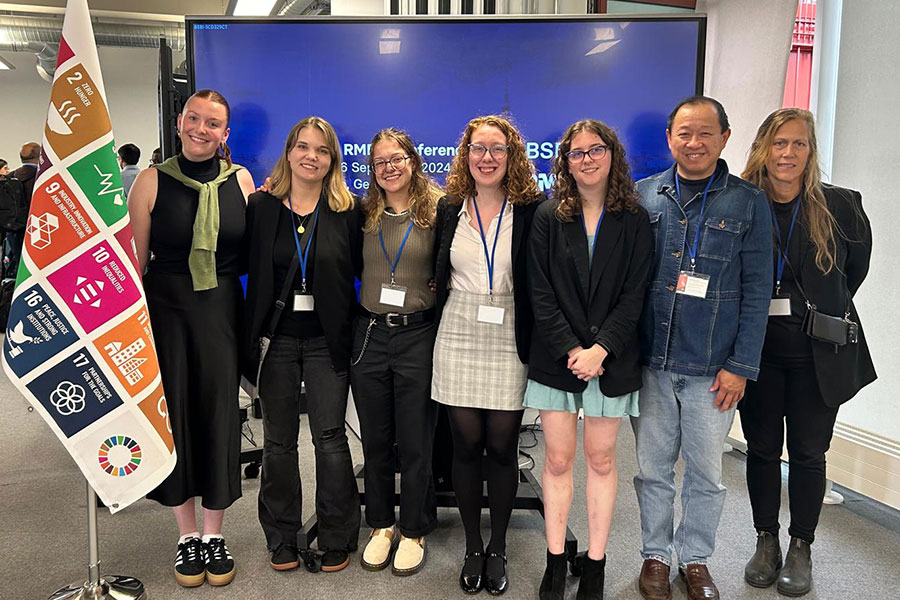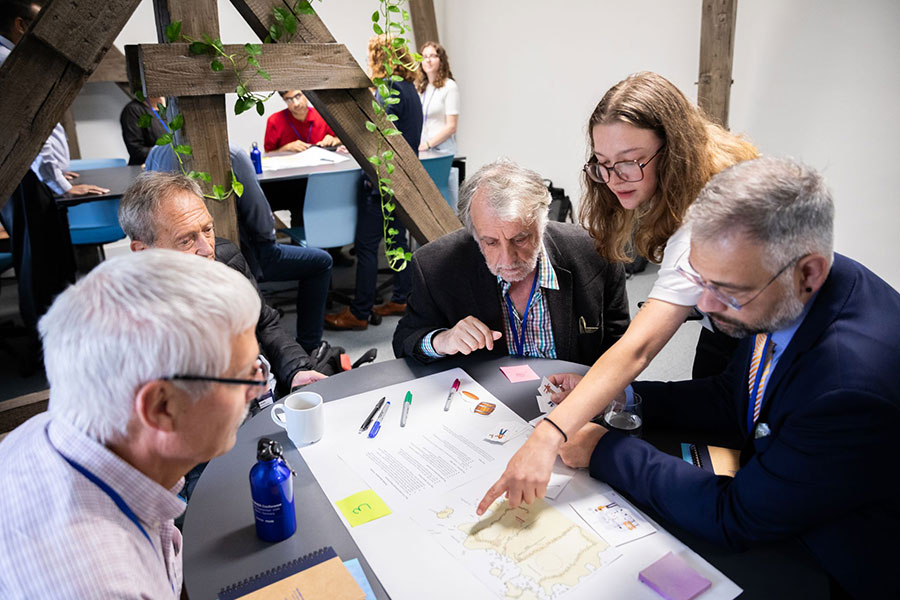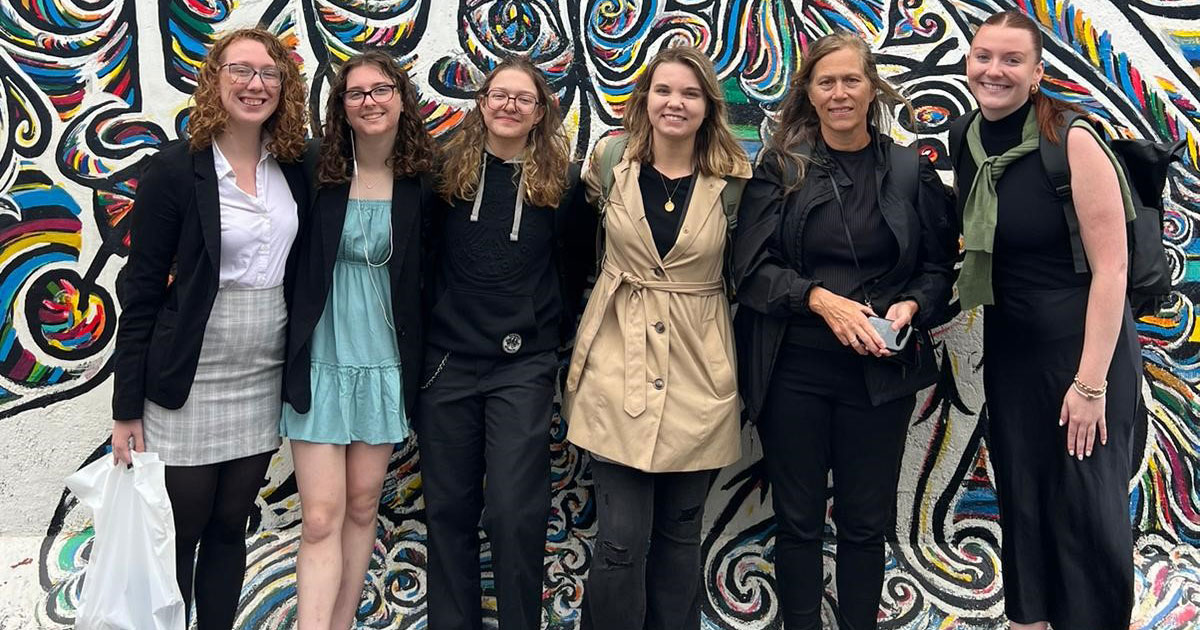Wicked Society students guide ‘distinguished researchers and academics’ at UN conference in Berlin
by Chad Osborne
October 17, 2024

How do you survive a zombie apocalypse?
A year ago, a group of students involved in Radford University’s Wicked Society presented a workshop to participants at the United Nations Principles for Responsible Management and Education (UN PRME) conference in Lisbon, Portugal, taking them through a scenario in which a virus outbreak had killed 99% of the world’s population.
It was a remarkable success, with Radford undergraduate and graduate students receiving high praise and awards for their work.
At this year’s UN PRME Conference, held in Berlin, Germany, Radford’s Wicked Society built on last year’s success, hosting two workshops, this time looking into the future and requiring the participating group of distinguished researchers and academics to “attend the D.E.A.D. Summit – Diplomatic Efforts for Altruistic Development,” explained Radford graduate student Maja Anderson, “a summit of clan leaders one year after the Zombie apocalypse.”
The Radford students spent nine months before the conference preparing for the workshop, creating video scenarios, maps of the imaginary world, and characters with backstories from the past year. They also piloted a version of this workshop at the Governor’s School for the Visual and Performing Arts and Humanities in July.
Each character was built on a wicked problem – those complex, persistent social issues that are nearly impossible to solve – such as “cross-border oppression, climate change, and a population crisis,” explained Anderson, a graduate student in Radford’s design thinking M.F.A. program and president of the university’s Wicked Society.
Anderson and Rachel Sharrett, society past president and graduate alum, presented the workshops with Radford undergraduates Frankie Pelletier, Riley Petroski, Caroline Sapp and Kate Stefanelli.
The object of the summit was to figure out collectively how to divvy up the resources of the gathered summit participants and plan for how to work together to further create a working society,” Anderson said.
To achieve success, participants “were instructed to use different design thinking methods, such as the bullseye/what's on your radar method, and visualize the vote,” said Stefanelli, a sophomore chemistry major and Wicked Society treasurer.

UN PRME Conference organizers viewed the Radford students’ workshops as a “huge success,” said Tay Keong Tan, a professor of political science and director of Radford University’s International Studies and Leadership Studies. “Our two 90-minute workshops were among the most engaging in the three-day conference as they are designed as experiential exercises to teach the solving of leadership and conflict management lessons in the contexts of cataclysmic events, or wicked problems.”
The Wicked Society at Radford was born in late 2022 with Tan urging students to focus studies and research on wicked problems. It began with the creation of a Wicked Problems Toolkit, a website that holds artifacts and resources for understanding and addressing various wicked issues.
In addition, Tan, along with a group of students and faculty, regularly participated in the biannual Wicked Festival, a showcase of hundreds of student projects focused on solving wicked problems. The fall 2024 Wicked Festival is scheduled for 5-7:30 p.m. Nov. 14 in the Artis Center for Adaptive Innovation and Creativity.
Running the simulation in Berlin helped Stefanelli understand “the different ways groups of people approach solving difficult problems and how there is never going to be one set answer to these problems,” she said. “While solving a zombie apocalypse is an unlikely problem we'll face, the different design processes can be applied to real-world issues such as climate change, drug trafficking, systematic oppression and social injustices.”
As early as their freshman year, Radford University students gain hands-on experience, conduct research, and run simulations that go beyond what many internships or academic conferences offer.
“It means so much to me that Radford offers these kinds of opportunities to students, especially undergraduates,” Stefanelli said. “As an undergraduate, I never thought I would have the opportunity to attend and present at a UN conference in Germany. This was such a big learning experience for me, giving me valuable experience in presenting outside of the typical classroom environment.”
Regardless of their major, every student at Radford University can engage in career-driven experiences that connect them meaningfully to their future profession.
For Pelletier, a junior media studies major with a journalism concentration, the conference was the perfect place to observe communications strategies and efforts in a global setting.

“Having the opportunity to watch the different ways in which professors and businesspeople from various cultures communicate with each other when trying to share information, create plans and persuade each other was really fascinating,” Pelletier said. “It also gives me more experience with communicating with different groups of people because journalism is really all about understanding your audience and how best to convey your stories to keep them interested.”
Following their workshops, Radford students received numerous compliments for their extraordinary work.
“Some professors [attending the conference] who were teaching communications ethics and business ethics said they would love to use our simulation in their classes to immerse students in the lesson,” Pelletier said, “and what really surprised me was some scholars saying our workshop inspired some ideas for research studies.”
Milenko Gudic, co-chair of the UN PRME Anti-Poverty Working Group and co-organizer/convenor of the RMER Conference in Berlin, said Radford “has a fantastic team” and thanked Tan and his students for their “formidable workshop in Berlin.”
“As I have already told you,” Gudic continued in an email to Tan, “you had a big challenge given the high expectations, but you responded by not only responding to the challenge but also by lifting the bar even higher.”
Tan, along with Anderson and Sharrett, has written a conference proceedings publication based on the group’s simulations. The text, entitled "Integrating Simulation and Design Thinking: Fostering Responsible Leadership through Apocalyptic Scenarios,” explores experiential learning approaches that teach leadership and character building. It will be included as a chapter in the 2025 book “Responsible Management Education with Impact: A Blueprint for Transformative Leadership Beyond 2030,” edited by Alexander Herzner, Ruth Areli García-León and Lisa Fröhlich.